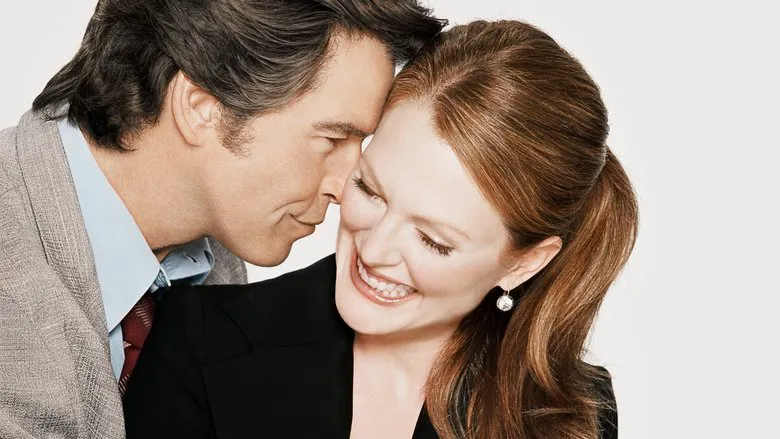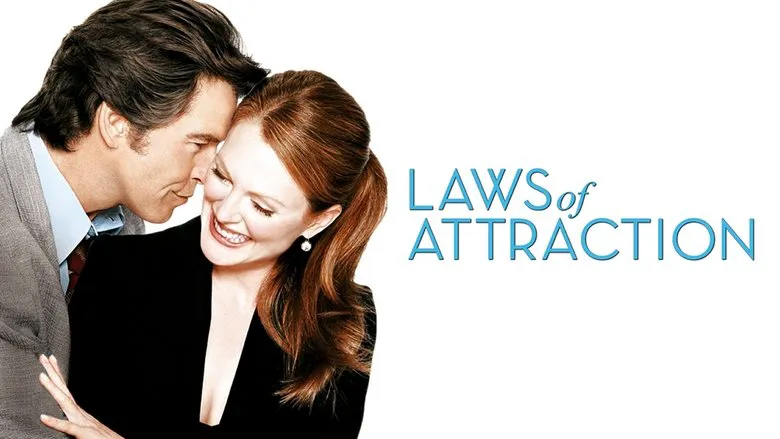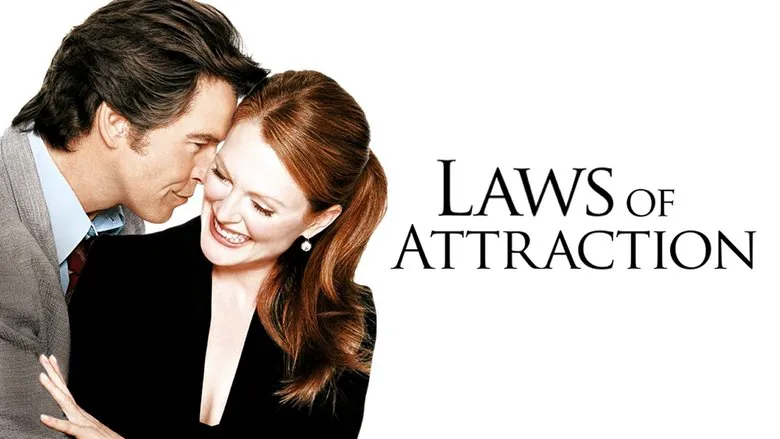The Laws of Attraction: A Comedy of Errors?
The box office success of “The Laws of Attraction” suggests that the need for relaxation and escapism isn’t limited to any one group. It seems that even the supposedly tireless and driven “them”—the wealthy and non-native—crave a break. They’re exhausted from working hard, embracing life, marriage, divorce, and career changes. Perhaps only chronic fatigue syndrome can explain why Peter Howitt’s bland, simplistic, and outdated romantic comedy landed in the top ten of American premiere weekends, even surpassing “Kill Bill: Volume 2.”

It’s disappointing to see that Howitt, with his experience and talent, could have created a sophisticated and witty successor to “Intolerable Cruelty.” The premise is similar: divorce intricacies in affluent America, two opposing lawyers weary of it all, and a trip to quaint Europe. The parallels are striking: the Coen brothers had Clooney and Zeta-Jones marry in Scotland, while Howitt has Brosnan and Julianne Moore in Ireland. However, Howitt seems to thrive on formalistic flourishes (“Sliding Doors”), montage-driven cinema, and paradoxical meaning. The producers, on the other hand, likely aimed for maximum simplicity to showcase the star power of the leads, which explains the multiple cast changes during the project. This conflict ultimately undermines the script, rendering it lifeless from the start.

Even poorly written romance novels have more substance. The plot follows the predictable “he-she” dynamic, starting with conflict, leading to accidental sex, and then legal disputes because “she” is offended by the randomness, while “he” wants more. But in America, sex is a technicality, and soon “feelings” emerge. These feelings are distinctly American, implying that protecting a woman externally is secondary to protecting her internally, from herself and the world. Inevitably, they accidentally marry, and the last half-hour hinges on whether “he” is willing and “she” is not. The marriage is merely a formality until “she” finally understands and realizes she’s in love.

Missed Opportunities in Directing
The only way to salvage such a predictable plot would be with a similarly feminine direction, emphasizing psychological authenticity over mere formalism. However, Howitt, while fond of eccentricity, is fundamentally a male director, ill-suited for a romance novel. The film starts promisingly, with Moore stress-eating pastries in the restroom, revealing the underlying turmoil beneath her successful facade. Brosnan, with his disheveled appearance, removes a crumb from her lip, hinting at a genuine connection. But the “romantic” expectation of an uninhibited “prince charming” gradually taming a hysteric, noticing and understanding her subtle mood changes, is never fulfilled. These nuances, which could have enriched the slow-paced and colorless script, are absent.

Howitt, as mentioned, lacks an understanding of “romanticism” and continues to churn out plot twists. Why does Moore, after breaking into Brosnan’s empty apartment, flee without stealing anything, running through a store, across the street, and dodging traffic? Because it’s “eccentric” and “eventful,” even though it only exacerbates her hysteria. The long period of legal battles is condensed into a quick montage, while a single divorce case involving two random eccentrics becomes an epic saga. The emphasis is anti-psychological, and the initial energy fades into pointlessness, making the film feel poorly edited. It’s as if all the footage was shot, but the wrong pieces were assembled. The film becomes tedious, and when Moore and Brosnan finally fly to Ireland, the supposed climax feels forced and contrived.

Saving Graces and Final Verdict
The most ironic aspect of the film is that the producers were right about the leads. Brosnan, even in “The Tailor of Panama,” showcased his world-class English acting skills beyond his Bond persona. Furthermore, he was born in Ireland, adding authenticity to his role. Throughout the film, he tries to inject life into his lawyer character, offering lines like, “Maybe we should have dinner? If not, we can eat here. I have a Snickers.” Brosnan delivers what’s needed whenever possible, but opportunities are limited. Even the cheesy “love” dialogue sounds natural coming from him. Moore, a proven actress, needs only a few strokes to convey her character, patiently and effortlessly navigating the “events.” However, she lacks the space to explore “moods,” resulting in a one-note performance. Hopefully, this doesn’t diminish her superstar status.

Ultimately, “The Laws of Attraction” is a palatable product for very tired people. It’s visually appealing, and the theme is eternally relevant. But if you’re well-rested, you won’t see any laws or even rules at all.
And there’s no love between Moore and Brosnan in the film. Yet happiness was so possible, so close…